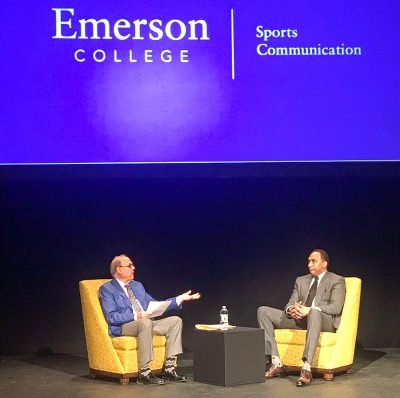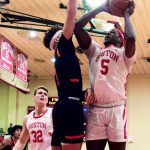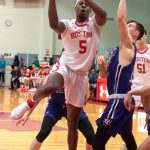
Stephen A. Smith spoke as a special guest Wednesday night at the Paramount Theatre in the downtown, where he discussed how he became a prominent figure in sports media and offered advice to the sports communications students in attendance.
The event was the fourth annual Al Jaffe Speaker Series in Sports Communication hosted by Emerson College. Jaffe, an Emerson alumnus, held management positions at ESPN for 28 years and moderated the conversation with Smith Wednesday.
Gregory Payne, the chair of communication studies at Emerson, discussed the speaker series in a press release.
“The Speaker Series is the signature event in the sports communication program, as it provides Emerson students with a unique opportunity to dialogue with leaders in the industry,” Gregory said.
Jaffe was one of the people who hired Smith at ESPN and said the decision to do so was a “no-brainer.” Smith and Jaffe sat down in front of a couple hundred attendees and got right to talking.
The pair spent a lot of time discussing Smith’s background, including his experience growing up with dyslexia and in Queens, New York.
Smith said he remembered “the entire block” laughing at him and used this as motivation to work hard in school to overcome this difficulty.
“All I cared about was no one would be able to laugh at me again,” he said.
Smith is as a featured commentator on ESPN’s radio show “First Take” and also has his own radio show, “The Stephen A. Smith Show,” every weekday. On Smith’s show, he discusses major events in the world of sports, bringing in the opinions of callers and guests.
Once, Smith said, he had a counselor laugh at him in school when he told them he wanted to go to college.
“I always knew I had a mission, and that’s what gave me confidence,” he said. “I haven’t been stopped, and I don’t plan on being stopped.”
Jaffe and Smith also discussed the state of sports journalism, noting how tough of a business it is today. Smith said to be in the business, “you have to have alligator skin.”
Jaffe asked Smith, “Is there any opinion you have said that you wish you researched more?”
Smith explained he sometimes makes mistakes because his mind is in multiple places at once. He’ll be juggling information on his laptop and phone with a live microphone in his face, he said, and this is how mistakes happen.
Later parts of the discussion centered around advice for sports communications students, of which there were many in attendance.
Smith told the students they need to be thinking about ratings, revenue and advertising sales if they want to be successful in their careers.
He said he has his two agenda items every day: “How do I make my bosses more money and how do I get some of it?”
Smith also warned students about the obsession with getting good grades, which he said are not all that matters. If good grades are all students care about, then they are “already behind the eight ball,” he explained.
He went on to say that going into the business of sports of journalism needs to be about passion. Smith is always in pursuit of truth and has been during his entire career, he noted.
To end the talk, Smith discussed his loved ones and friends who are important to him.
“When my day comes, I think my funeral will be packed,” Smith said. “There’s a lot of people that love me.”














